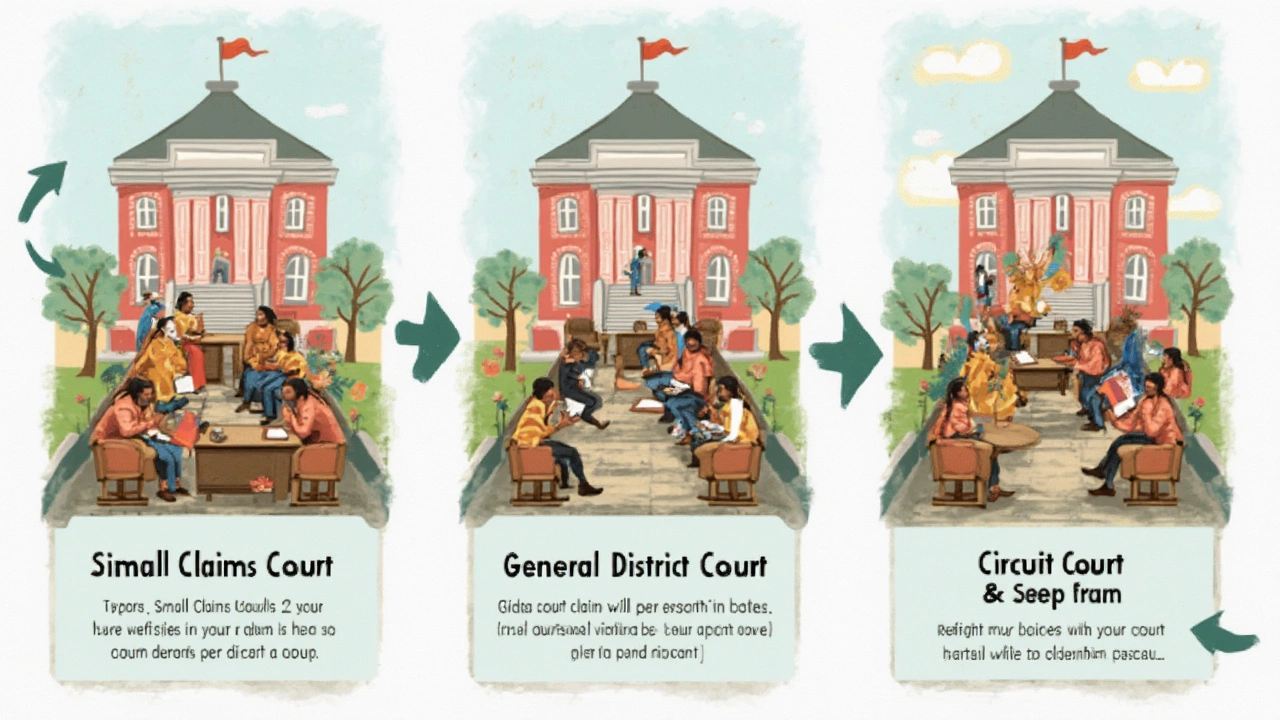Ever try figuring out where your civil case goes in Virginia? It can feel like you’re caught in a maze with no signs. Whether you’re fighting over a security deposit, a car accident, or a business dispute, you can’t just walk into any courthouse. Picking the wrong court could mean your case gets tossed before it even begins.
Virginia sorts civil cases by the court’s job and the dollar value at stake. So, knowing which courtroom holds the gavel over your kind of case is step one. Miss that and you waste time, money, and your best shot at justice.
If you want to get it right, you need to know which court handles small claims, which handles big fights, and why you might need to skip the fancy courthouse downtown. This guide gives you the real scoop for seeing your case through in Virginia.
- VA's Different Civil Courts Explained
- Choosing the Right Court for Your Civil Case
- When to Head to Small Claims Court
- What Happens in General District Courts?
- Circuit Courts: Big Money, Bigger Stakes
- Tips for Filing and Surviving the Process
VA's Different Civil Courts Explained
Virginia doesn’t have just one place for civil cases. The state splits these cases between three main types of courts, and each has its own job. Messing up which one to use is a classic mistake, so here’s how it shakes out:
- General District Court – This is the go-to for most small and mid-sized civil claims. If you’re fighting over less than $25,000, you’ll usually end up here. No jury, just a judge making the call. Landlord-tenant fights, unpaid bills, simple contract drama—they all land in this courtroom.
- General District Court Small Claims Division – This spot is for even simpler cases—think neighborhood level. If your claim is $5,000 or under, small claims lets you speed things up and skip the lawyers. You just tell your story to the judge and get a decision, usually on the same day you show up.
- Circuit Court – This is where the bigger cases, complicated stuff, or those that ask for more than $25,000 go. If you want a jury, this is your place. Circuit Court also handles family matters, serious injury lawsuits, and sometimes appeals from the lower courts.
Take a look at this breakdown for what each court usually handles:
| Court Type | Usual Case Types | Dollar Limit | Jury? |
|---|---|---|---|
| General District | Debt collection, personal property, small contracts | Up to $25,000 | No |
| Small Claims (GDC) | Simple disputes, minor money cases | Up to $5,000 | No |
| Circuit Court | Big contracts, injury lawsuits, appeals | Any amount | Yes, if requested |
Knowing where a *VA civil court* will hear your case saves time and headaches. Skip the courthouse shuffle: match your problem and your dollar amount to the right courtroom.
Choosing the Right Court for Your Civil Case
Trying to file a civil case in Virginia? You need to pick the right court straight out of the gate, or your case isn’t even getting off the ground. Virginia has three main courts that handle civil stuff: Small Claims Court, General District Court, and Circuit Court. Picking the wrong one usually means your claim gets kicked back, and nobody has time for that hassle.
Here’s how it typically breaks down by the numbers and the types of disputes:
| Court | Type of Cases | Dollar Limit | Other Details |
|---|---|---|---|
| Small Claims Court | Simple disputes (like unpaid debts, landlord-tenant, car repairs) | Up to $5,000 | No lawyers needed, fast process |
| General District Court | Most civil cases, contract disputes, personal injury, evictions | Up to $25,000 | Lawyers allowed, but not required |
| Circuit Court | Big-money lawsuits, appeals from lower courts, family and estate matters | $25,000 and above | Lawyers usually required, formal procedures |
So, what actually decides where your case goes? It’s a mix of the amount at stake and the kind of dispute. For example, suing someone for $800? That’s usually Small Claims. $10,000 car accident? You’re looking at General District. Eyeing damages over $30,000 or a nasty custody battle? Welcome to Circuit Court.
Don’t forget, the VA civil court rules expect you to file your case in the city or county where the defendant lives, or where the issue happened. That’s called “venue.” Pick the wrong spot and the judge can throw out your case—even if you picked the right type of court.
- If you want a simple process and your dispute is small, start with Small Claims Court.
- If your case is more complicated or you want to ask for more than $5,000 (up to $25,000), General District Court is for you.
- For big fights, major money, or appeals, Circuit Court is your destination.
Tip: The General District Court is the busiest in Virginia, handling over 2 million cases a year. So, don’t be shocked if your case takes a while to get a court date.
If you’re stuck or confused, most court websites have forms and tools to help you decide where to file. Don’t guess. Getting it right the first time can save you money, headaches, and a lot of wasted afternoons.
When to Head to Small Claims Court
If you’re dealing with a straightforward dispute and the amount of money is $5,000 or less, take a close look at small claims court. This part of the VA civil court system is where everyday people can settle things quickly—like unpaid rent, a busted fence, or that friend who never paid you back for concert tickets.
Small claims court in Virginia is part of the General District Court but runs on simple rules. You don’t need a lawyer and, honestly, most folks show up without one. The judge expects real talk, not legal jargon. There are no juries. The process is faster, and court fees are way lower than what you’d cough up for bigger cases.
- You have to file your case in the city or county where the other person lives or where the problem happened.
- The person you’re suing—the defendant—must be served with your court papers.
- You’ll usually get your court date a few weeks after you file.
- If you win, the court can order the other party to pay up or return your property, but it doesn’t chase them down for you.
Don’t expect to argue over super-complicated stuff like business contracts with fine print or big real estate battles. Small claims is best for simple cases—personal loans, minor property damage, unpaid services, or customer complaints. If your claim is a bit over $5,000, you’ll have to look at the next-level court instead.
One big tip: Bring every scrap of evidence you’ve got—receipts, messages, photos. Print them out. Judges love clear proof, and it’s better than getting into a he-said-she-said mess. If you win, keep in mind you might still have to do extra paperwork to actually get your money back.

What Happens in General District Courts?
If your civil case lands in Virginia’s General District Court, you’re dealing with the busiest level of trial court in the state. These courts handle civil cases where the amount in controversy is up to $25,000. If you’re owed $5,000 by a contractor or you’re in a landlord-tenant squabble under $25,000, this is probably where you’ll end up.
Here’s what sets General District Courts apart: there’s no jury. A judge hears both sides and makes the decision. Things move a lot faster here compared to higher courts, which can be a relief if you hate drawn-out legal drama.
- No need for fancy legal filings—forms are straightforward and the process is less intimidating for people without lawyers.
- Hearings are typically scheduled within a month or two after you file—some places even sooner.
- Most cases are resolved during the first hearing, which usually lasts under an hour.
If you lose in General District Court, you’re not stuck. You can appeal to Circuit Court, where things reset and you might get a jury if you want one.
Take a look at some numbers to get the vibe:
| Case Type | Typical Amount | Who Can File |
|---|---|---|
| Small Claims | Up to $5,000 | Individuals Only |
| Regular Civil Cases | $5,001 to $25,000 | Anyone (including businesses) |
| Unlawful Detainer (Eviction) | Any Amount (if about possession only) | Landlords |
One last thing: you don’t need a lawyer here, but if your case feels over your head (like business contracts or serious car wrecks), talking to a pro doesn't hurt. VA civil court rules still apply, and a mistake can cost you even in this faster, simpler setting.
Circuit Courts: Big Money, Bigger Stakes
If your civil case in Virginia deals with big money, real estate fights, or you're thinking about an appeal, you’re heading straight for the circuit court. These courts handle most civil lawsuits claiming more than $25,000 and any case looking for an official court order (like an injunction). If you want a jury, this is also the right place. The judges here see some of the most complicated fights—everything from breach of contract to property battles and business bust-ups.
Here’s a breakdown of what lands in circuit court:
- VA civil court cases claiming over $25,000
- Lawsuits about real estate, like landlord-tenant disputes over property ownership
- Requests for court orders (injunctions or restraining orders)
- Appeals from general district court (if you don’t like a lower court’s decision)
- Wills, probate, and disputes over trusts or estates
It’s not just about the amount of money, but also the type of case. Smaller money cases or simple claims stay in lower courts, but if you’re dealing with something that could change a person’s life or bank account, you’ll see the inside of a circuit court.
If you’re nervous about cost and time—yeah, it can get steep. Circuit courts are formal, and legal rules are strict. Don’t forget there’s usually a filing fee, which changes by county but often starts around $86 just to file a lawsuit. That money goes up fast if your case needs lots of paperwork or if it drags out.
| Type of Case | Minimum Dollar Amount | Can Get Jury? |
|---|---|---|
| Personal Injury (Car Crash) | $25,001+ | Yes |
| Contract Dispute | $25,001+ | Yes |
| Real Estate Disagreements | Any | Yes |
| Probate (Wills/Estates) | N/A | No |
| Appealing District Court Cases | N/A | Yes |
Here’s a tip: Don’t try to wing it alone if your case is in circuit court. The laws and court procedures can get tricky, and mistakes cost way more than hiring some help. If your case ends up here, at least talk to a lawyer before you make a move. It’s not like small claims, where you can probably just show up and talk to the judge. In circuit court, details matter, and so does showing up prepared.
Tips for Filing and Surviving the Process
Let’s be blunt: getting lost in court paperwork or missing your hearing can kill your case in VA faster than you’d think. Here’s what really matters when you’re dealing with a civil case—broken down so anyone can follow it.
- Start with the right court. Small claims (under $5,000) go to General District Court. Anything bigger, or if you want a jury trial, you’re probably headed to Circuit Court. It’s not just about money—the type of case decides your venue, too. Double-check your local court’s website if you’re not sure.
- Read the Virginia court forms carefully. Seriously, every line counts. One typo or wrong address can mean your papers never get served right. Use the sample forms on courts.state.va.us—they’re actually pretty decent.
- Serve the other side correctly. Virginia courts require you to notify the other person or business. You’ll usually pay a small sheriff’s fee (around $12), and if you mess this up, your case might get kicked out.
- Don’t miss deadlines. A late filing in Virginia means you start over. Even a day late on an appeal from General District Court to Circuit Court and you lose your shot—no excuses.
- Bring evidence. For a car accident, that means repair bills, photos, and insurance letters. Landlord dispute? Show your lease, checks, and email records. No evidence, no win.
- Dress for court, but don’t overthink it. Jeans and a t-shirt are risky. Go for business casual. You don’t want a judge’s first impression to be a hoodie.
Here’s a quick cheat-sheet for some common filing facts in VA courts:
| Step | General District Court | Circuit Court |
|---|---|---|
| Typical Case Amount | Up to $25,000 | $4,500 and up (including appeals) |
| Filing Fee (as of 2024) | $40-$69 | $86-$344 (depends on amount) |
| Jury Trial? | No | Yes, if requested |
| Appeal Deadline | 10 days after judgment | 30 days after judgment |
If you want folks to listen to your side, keep calm, stick to the facts, and don’t interrupt the judge. One last thing: if your case is weird or tricky, talk to a local lawyer. Even a quick consult can save you from a painful court blunder.


